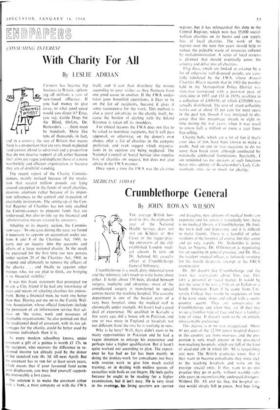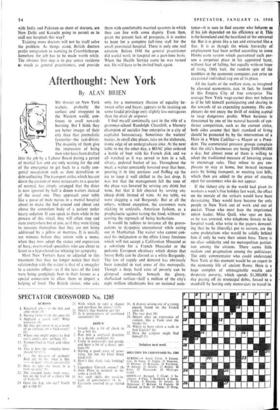MEDICINE TODAY
Crumblethorpe General
By JOHN ROWAN WILSON
TIIE average British hos- pital in this, the eighteenth year of the National Health Service, does not rest on Kildare or Ben Casey or the rugger-play- ing extroverts of the old- established London medi- cal schools. It rests on Dr. Achmed Ali, casualty officer at Crumblethorpe General Infirmary.
Crumblethorpe is a small, dirty industrial town and the infirmary isn't much to write home about either. It holds about 150 beds, divided between surgery, medicine and obstetrics—most of the complicated surgery is transferred to special centres nearer the teaching hospital. The casualty department is one of the busiest parts of a very busy hospital. since the medical staff is chronically under strength. Ali hasn't had a great deal of experience. He qualified in Karachi a few years ago, did a house job in Pakistan, and one or two more in England at hospitals not too different from the one he is working in now.
Why is he here? Well, there didn't seem to be many opportunities in Pakistan and he had a vague intention to enlarge his experience and perhaps take a higher qualification. But it hasn't quite worked out according to plan. The experi- ence he has had so far has been mainly in doing the donkey-work for consultants too busy with routine work to give him much useful training, or in dealing with endless queues of casualties with boils or cut fingers. He feels guilty because he ought to be reading for a higher examination, but it isn't easy. He is very tired in the evenings, his living quarters are spartan and draughty, new editions of medical books are expensive and his salary is W. retchedly low: there is no medical library at Crumblethorpe. He finds the tow n dull and depressing and it is difficult to make friends. There is a handful of other residents at the hospital. of course, but they come and go very rapidly. Dr. Akibombo is going back to Nigeria. Dr. 0-Donovan is negotiating for an opening in general practice, and Dr. Das, the resident surgical officer, is furiously swotting for his fourth desperate attempt at the FRCS examination.
Dr. Ali doesn't like Crumblethorpe and the town has reservations about him, too. This isn't a personal or racial matter. It would be just the same if he v.as a Pole or an Italian or a South American. Even if he came from Uni- versity College they vs ould be suspicious of him if he wore suede shoes and talked M jib a south- country accent. They are conservative in Crumblethorpe and w hen they Are ill they like to see a familiar type of face and hear a familiar type of voice. It doesn't seem to be an entirely unreasonable preference.
This picture is in no way exaggerated. About 40 per cent of the 12.500 junior hospital doctors in this country are from overseas, and the pro- portion is very much greater in the provincial non-teaching hospitals, which are full of the kind of dead-end job in which Dr. Ali is languishing just now. The British graduates know that if they want to become consultants they must stick to the teaching hospitals and work on the prestige special units. If they want to go into practice they go in early, without wasting valu- able years in uncomfortable, underpaid drudgery. Without Dr. Ali and his like, the hospital ser- vice would simply. fall to pieces. And how long,
with India and Pakistan so short of doctors, are New Delhi and Karachi going to permit us to staff our hospitals this way?
Training more doctors will not by itself solve the problem. As things stand, British doctors prefer emigration to working in Crumblethorpe. Somehow the job has to be made worth while. The obvious first step is to pay senior residents is much as general practitioners, and provide them with comfortable married quarters in which they can live with some dignity. Even then, given the present lack of prospects, it is useless to hope for a complete full-time staff for the small provincial hospital. There is only one real solution. Before 1948 the general practitioner did useful work in hospital on a part-time basis. When the Health Service came be was turned out. He will have to be invited back again.



































 Previous page
Previous page